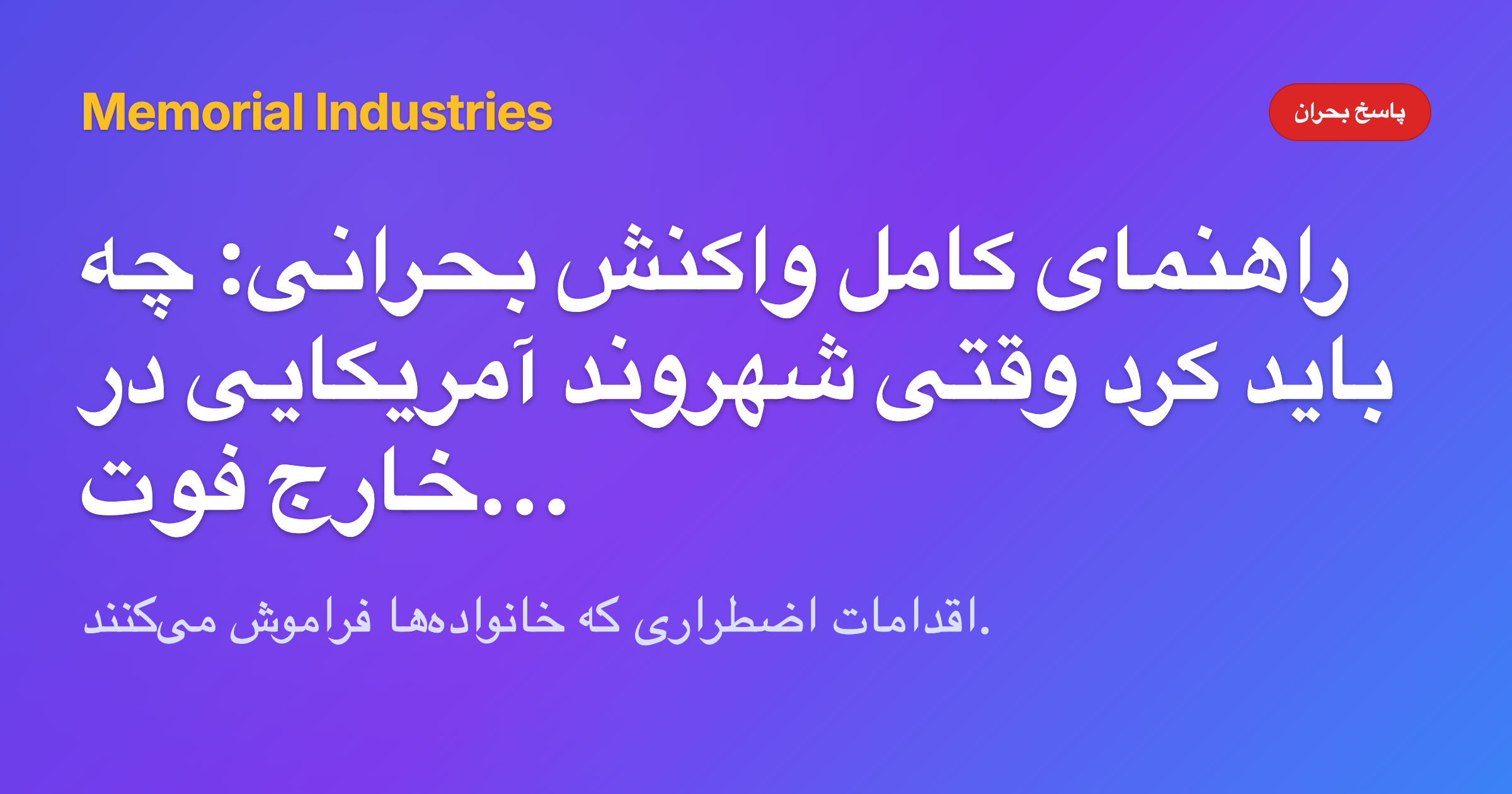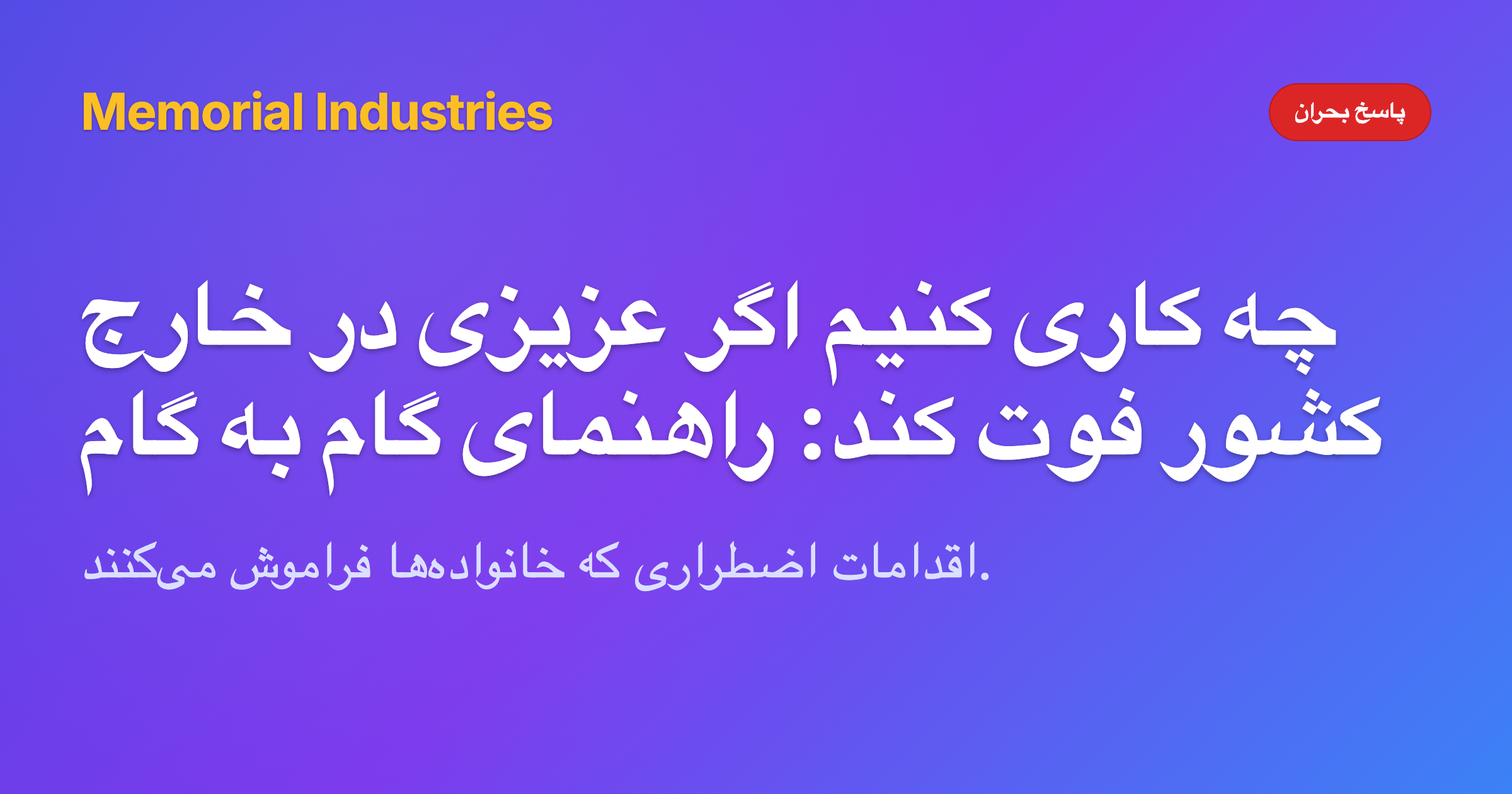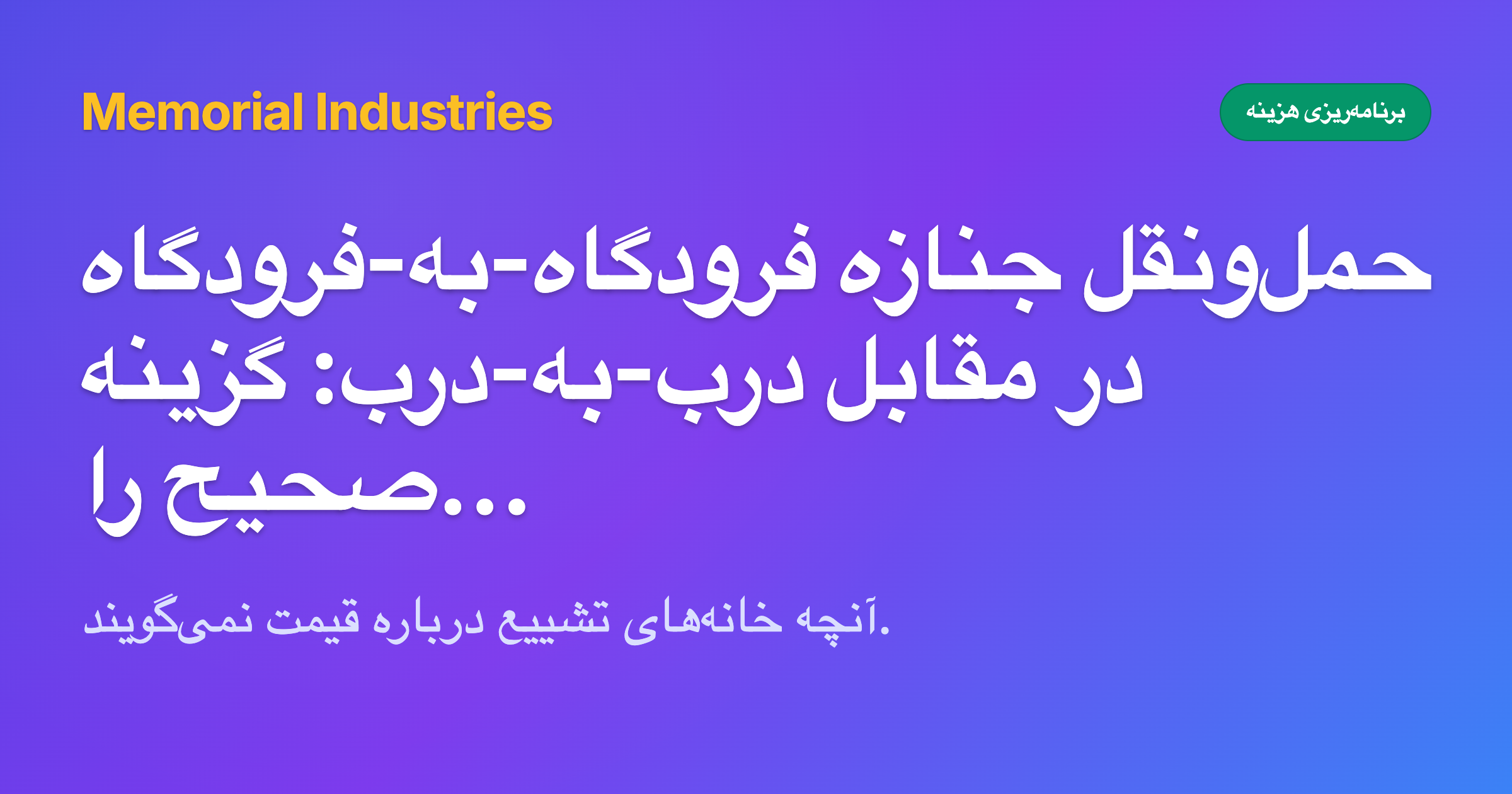
- Jan 27, 2025
- 6 min read
۴۸ ساعت اول پس از فوت در خارج کشور: چه انتظاری داشته باشیم
۴۸ ساعت اول پس از فوت در خارج کشور برای خانوادهها حیاتی بوده و میتواند تأثیر قابل توجهی بر کل فرایند بازگشت داشته باشد. این دوره پایههای همه چیزهای بعدی را، از رویههای قانونی تا انتظارات زمانبندی، تعیین میکند.
درک آنچه در طول این ساعات ابتدایی حیاتی اتفاق میافتد به خانوادهها کمک میکند بحران فوری را پشت سر گذارند در حالی که زمینهسازی برای بازگشت موفق فراهم میکنند. تصمیمات حساس به زمان که اکنون گرفته میشود بر هزینهها، زمانبندیها و تجربه کلی تأثیر میگذارد.
ساعت ۱-۲: پاسخ فوری اضطراری
اگر فوت غیرمنتظره بوده یا بیرون از مراکز پزشکی رخ داده باشد، فوراً با خدمات اضطراری محلی تماس بگیرید. حتی اگر پرسنل پزشکی قبلاً حاضر باشند، اطلاع رسمی به مقامات برای شروع فرایند تحقیق قانونی فوت طبق قانون محلی ضروری است.
پیکر را جابهجا نکرده یا صحنه را مختل نکنید تا زمانی که مقامات محلی مجوز صادر کنند. این برای انطباق قانونی حیاتی بوده و از پیچیدگیهایی که میتواند کل فرایند بازگشت را روزها یا هفتهها به تأخیر بیندازد جلوگیری میکند.
ساعت ۲-۶: اطلاعرسانی رسمی و مستندسازی
در اسرع وقت، ترجیحاً در نخستین ساعات، به نزدیکترین سفارت یا کنسولگری ایران اطلاع دهید. کارکنان سفارت به طور خاص برای این موقعیتها آموزش دیدهاند و شما را در رویههای فوری مورد نیاز راهنمایی کرده و رویههای کنسولی را به طور موازی با مقامات محلی شروع میکنند.
از این نقطه به بعد همه چیز را مستند کنید. یک دفترچه اختصاصی یا فایل تلفنی برای ثبت تمام مکالمات، شمارههای مرجع، نامهای مقامات رسمی و دستورالعملهای دریافتی ایجاد کنید. این مستندسازی با پیچیده شدن رویهها و درگیری چندین سازمان بهشدت ارزشمند میشود.
Notify the nearest U.S. Embassy or Consulate as soon as possible, ideally within the first few hours. Embassy staff are trained specifically for these situations and will guide you through immediate requirements while beginning consular procedures in parallel with local authorities.
Begin documenting everything from this point forward. Create a dedicated notebook or phone file to record all conversations, reference numbers, official names, and instructions received. This documentation becomes invaluable as procedures become complex and multiple agencies become involved.
Hour 6-12: Insurance and Family Coordination
Contact your loved one’s travel insurance provider if they had coverage. Many policies include repatriation benefits, but early notification is often required to maintain coverage eligibility. Document the claim number and specific coverage details immediately.
Begin coordinating with immediate family members who need to be involved in decisions. Identify who has legal authority to make arrangements and ensure they’re prepared for the decisions that will need to be made in the coming hours and days.
Hour 12-24: Professional Service Selection
Research and contact professional international repatriation services. Time is critical, as the body cannot remain indefinitely without proper care, and each day of delay can complicate procedures and increase costs.
Verify the credentials of any service provider, including licensing, airline relationships, and experience with your specific countries involved. Request detailed service agreements and cost estimates, as these decisions affect the entire repatriation process.
Hour 24-36: Legal and Medical Procedures
Local authorities will complete their investigation and death determination procedures. This timeline varies significantly by country and circumstances, ranging from a few hours to several days depending on local requirements and the nature of the death.
Medical examiner or coroner procedures may be required, including autopsy if mandated by local law. Understanding these requirements early helps set realistic expectations for family members and funeral planning at home.
Hour 36-48: Documentation and Preparation Planning
Official death certificate processing begins once authorities complete their procedures. This document is the foundation for all subsequent repatriation procedures and typically takes 48-72 hours to complete in most countries.
Body preparation planning begins with mortuary facility coordination. Professional repatriation services arrange for proper care and storage while documentation procedures are completed, ensuring dignity and compliance with health regulations.
Critical Decisions That Cannot Wait
Several time-sensitive decisions must be made during the first 48 hours that significantly impact the entire repatriation process. Choosing between intact body transport versus cremation affects costs, timeline, and religious considerations.
Service level decisions (airport-to-airport versus door-to-door) impact both costs and family involvement requirements. These choices are difficult to change once procedures begin, making early decision-making critical.
What to Expect from Authorities
Local police or medical authorities will conduct required death investigations according to their procedures. This may include witness interviews, scene documentation, or medical examination depending on circumstances and local requirements.
Embassy or consular staff will provide guidance on U.S. requirements while liaising with local authorities. They cannot expedite local procedures but can help ensure all necessary steps are completed correctly for U.S. entry requirements.
Common Mistakes to Avoid
Do not attempt to handle international repatriation procedures independently during this critical period. The complexity of coordinating multiple agencies, understanding various legal requirements, and managing time-sensitive procedures requires professional expertise.
Avoid making hasty decisions about service providers without verification. The crisis nature of the situation makes families vulnerable to inadequate services or excessive pricing from providers who take advantage of emergency situations.
Preparing for the Days Ahead
Understand that the first 48 hours establish the framework for a process that typically takes 7-14 days total. Early decisions about service providers, service levels, and procedure approaches affect everything that follows.
Set realistic expectations with family members about timelines and decision-making requirements. The repatriation process involves multiple complex procedures that cannot be rushed, despite the emotional desire to bring loved ones home quickly.
Support Resources During Crisis
Professional repatriation services provide 24/7 family liaison support specifically for crisis situations. These specialists understand the emotional difficulty of the situation while managing the practical requirements effectively.
Embassy consular services offer after-hours emergency support for American citizens abroad. They can provide guidance on immediate requirements and help coordinate with local authorities during non-business hours.
Setting Up for Success
The actions taken during the first 48 hours determine whether the repatriation process proceeds smoothly or encounters delays and complications. Professional guidance during this critical period ensures all procedures begin correctly and efficiently.
Early coordination with qualified repatriation services, proper documentation of all interactions, and clear communication with family members creates the foundation for successful repatriation and appropriate memorial services.

Related articles

راهنمای کامل واکنش بحرانی: چه باید کرد وقتی شهروند آمریکایی در خارج فوت میکند
Sep 8, 2025

چه کاری کنیم اگر عزیزی در خارج کشور فوت کند: راهنمای گام به گام
Jan 30, 2025

آیا باید انتقال پیکر را خودتان انجام دهید؟ راهنمای تصمیمگیری بحرانی برای خانوادهها
Aug 19, 2025

چگونه پیکر عزیز خود را به وطن بازگردانیم: راهنمای گام به گام
Jan 29, 2025

هزینههای حملونقل بینالمللی جنازه: تحلیل جامع
Jan 28, 2025

حملونقل جنازه فرودگاه-به-فرودگاه در مقابل درب-به-درب: گزینه صحیح را انتخاب کنید
Jan 26, 2025